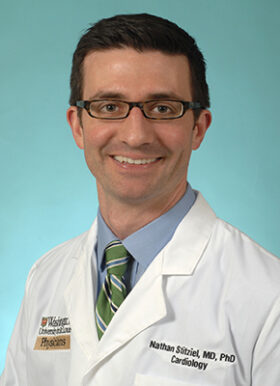
Nathan O. Stitziel, MD, PhD
Professor of Medicine and Genetics
Associate Director, Medical Scientist Training Program
Director, Center for Cardiovascular Genetics
Director, Translational Cardiovascular Genetics
- Phone: 314-362-1291
Related Links
Education
- BA Mathematics and Physics: Washington University, St. Louis, MO (1998)
- MD: University of Illinois, Chicago, IL (2006)
- PhD Bioinformatics: University of Illinois, Chicago, IL (2006)
- Residency, Physician Scientist Development Program: University of Chicago, Chicago, IL (2008)
- Fellowship, Cardiology: Brigham and Women’s Hospital, Harvard Medical School, Boston, MA (2012)
- Postdoctoral Fellowship: Brigham and Women’s Hospital, Massachusetts General Hospital, Broad Institute, Boston, MA (2012)
- Clinical Fellow, Cardiovascular Genetics: Brigham and Women’s Hospital, Harvard Medical School, Boston, MA (2012)
Recognition
- Young Physician Scientist Award, American Society for Clinical Investigation, 2015
- Jeremiah Stamler Distinguished Young Investigator Research Award, 2014
- Eugene Braunwald Fellow in Cardiovascular Medicine, Brigham and Women’s Hospital, 2010–2011
- Alpha Omega Alpha, University of Chicago, 2007
- Williamson award (best medical student in Internal Medicine), University of Illinois, 2006
- Radulovacki award (best research in the basic sciences), University of Illinois, 2006
- BA with honors, Washington University, 1998
Clinical Interests
Cardiovascular Genetics; inherited cardiovascular disease; genetic syndromes; cardiomyopathy and arrhythmia genetics
Research Interests
Naturally occurring human genetic variation has proven to be a powerful tool for uncovering causal genes and pathways in a variety of cardiovascular disorders. Despite substantial progress in gene mapping, however, the majority of the inherited basis for complex cardiovascular traits remains unexplained. Recently developed techniques allowing for low-cost interrogation of the entire genome are now ushering in a new era of genetic studies. New analytic challenges are simultaneously being uncovered as we face the daunting task of interpreting and translating increasingly large amounts of complex genetic data.
Our research sits at the intersection of computational biology and human genetics to face these challenges in studying the inherited basis of cardiovascular disease. Using a variety of techniques in genomics and bioinformatics, my laboratory is interested in: 1) Identifying novel genes and pathways underlying both Mendelian and complex forms of disease; 2) Developing innovative computational methods for the analysis of complex genetic data; and 3) Applying insights gained from human genetics to improve patient care.